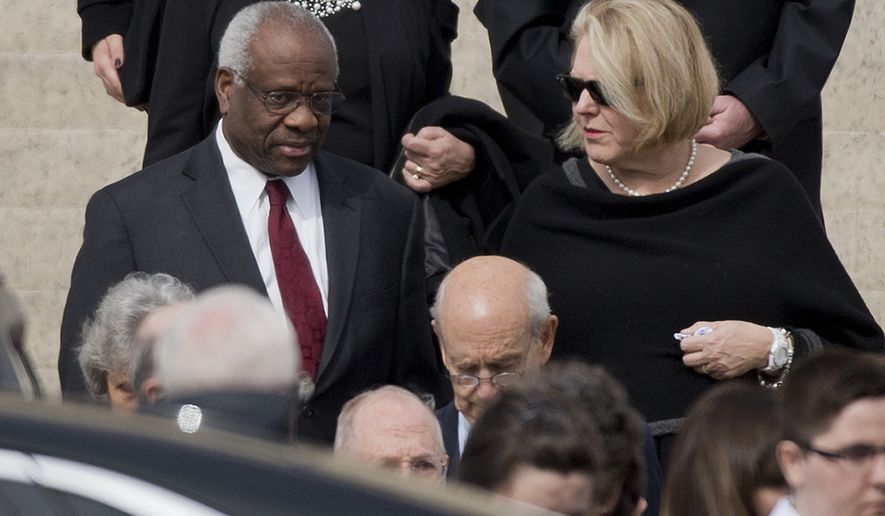To sit or not to sit — that is the question Supreme Court justices are suddenly facing.
Democrats are demanding that Justice Clarence Thomas recuse himself from any cases dealing with the fallout from the 2020 election, including battles over the events of Jan. 6, 2021, and former President Donald Trump’s resistance to cooperating with investigators, after revelations that the justice’s wife had pressed the administration to challenge the election results.
Meanwhile, Republicans got Judge Ketanji Brown Jackson, cruising toward confirmation for a high court seat, to say she will recuse herself from a looming case involving racial preferences in Harvard University’s admissions policy. She sits on Harvard’s Board of Overseers.
The moves are raising questions about when justices should pull themselves from hearing cases.
There are no binding rules on the high court, and several legal experts said barring specific conflicts of interest, justices have a duty to try to hear every case.
Josh Blackman, a professor at South Texas College of Law, said being on the high court brings an “obligation to sit” for cases.
He dismissed the calls for Justice Thomas to pull himself from the lineup over revelations about his wife, Virginia “Ginni” Thomas. Mr. Blackman said there aren’t any pending cases involving Mrs. Thomas herself, so there’s no conflict for the justice.
“It’s a lot of politics,” Mr. Blackman said.
Judge Jackson’s situation is different, said Ilya Shapiro, a Supreme Court and judicial nominations expert. Sitting on the university’s board gives her a clear conflict, which she has recognized in announcing her plans to recuse herself.
“That’s not surprising, and that’s an easy call,” Mr. Shapiro said.
Judge Jackson is expected to be confirmed to the high court later this week with bipartisan support after Sen. Susan M. Collins, Maine Republican, announced she’ll join Democrats in supporting her nomination. The Senate Judiciary Committee will first vote on the nominee before she moves for consideration by the full Senate.
Though there is a code of conduct for federal judges, it doesn’t govern the Supreme Court, and the justices have never adopted their own ethics guidelines.
Democratic lawmakers say in light of the controversy over Justice Thomas’ wife, it’s time the court creates one. Two dozen Democrats sent Chief Justice John G. Roberts Jr. a letter last week asking him to commit by April 28 to creating an official code of conduct.
They also challenged Justice Thomas’ past participation in cases.
“We call upon Justice Thomas to immediately issue a written explanation for his failure to recuse himself in prior Supreme Court cases involving efforts to overturn the 2020 election or the January 6th attack on the Capitol and promptly recuse himself from any future Supreme Court cases involving efforts to overturn the 2020 election or the January 6th attack on the Capitol,” the Democrats wrote.
Senate Minority Leader Mitch McConnell said the jabs at Justice Thomas are the latest in a string of attempts to “bully” the court and “nullify” Justice Thomas.
“Make no mistake. This performative outrage is not in earnest,” the Kentucky Republican said on the Senate floor. “This is a political hit, part of liberals’ yearslong quest to delegitimize the Court. All because our laws and Constitution occasionally inconvenience Democrats’ radical agenda.”
He said recusal calls also have been aimed at Mr. Trump’s three court appointees, Justices Neil M. Gorsuch, Brett M. Kavanaugh and Amy Coney Barrett, and Justice Samuel A. Alito Jr., a pick of President George W. Bush.
“All based on spurious accusations about fake ethical problems or partiality,” Mr. McConnell said.
Recusal calls go both ways.
Some conservatives had argued the late Justice Ruth Bader Ginsburg should have recused herself from cases involving Mr. Trump after she said harsh things about him during the 2016 campaign.
“He is a faker,” she said at the time. “He has no consistency about him. He says whatever comes into his head at the moment. He really has an ego. … How has he gotten away with not turning over his tax returns? The press seems to be very gentle with him on that.”
There was also pressure from liberal groups against the late Justice Antonin Scalia to recuse from a case involving former Vice President Dick Cheney after news broke that Scalia attended a hunting trip with Mr. Cheney ahead of ruling on the case.
Congress could create a system of ethics for the high court, said Jonathan Turley, a law professor at George Washington University.
“The justices have long maintained that, as members of the highest court in our system, no lower court judges can sit in judgment of their actions. I have long disagreed with that logic. This is not an appeal from the merits of a case but a judgment on their own conduct. A justice can be charged and tried on any number of offenses as an individual,” Mr. Turley said.
Gabe Roth, executive director of Fix the Court, said Section 455 of Title 28 in federal law gives justices a guide to recuse when bias or a conflict of interest arises in a case, but he said there’s no way to enforce the law.
“The only way to kick a justice off a case is to kick them off the court, and no one serious is talking about that now,” Mr. Roth said. “Two informal ways to try compel recusal exist. There’s peer pressure — i.e., one justice, maybe the Chief, could gently suggest to another that his or her participation in a case might look bad ethically. And there’s the court of public opinion — if enough bipartisan legal scholars and media outlets call for a recusal, that might convince a justice to recuse.”
• Stephen Dinan can be reached at sdinan@washingtontimes.com.
• Alex Swoyer can be reached at aswoyer@washingtontimes.com.




Please read our comment policy before commenting.